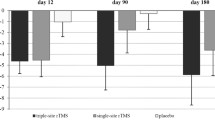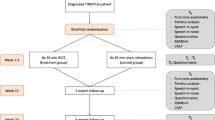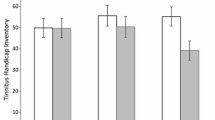Abstract
Repetitive transcranial magnetic stimulation (rTMS) has been proposed as an alternative option for treating tinnitus. rTMS is a noninvasive method in which repetitive magnetic stimulation is applied to the cortex; it is considered a therapeutic strategy that modulates the loudness of tinnitus. In this study, we performed a double-blind randomized clinical trial to compare the outcome of tinnitus treatment among (1) dual-site (auditory + prefrontal) rTMS stimulation, (2) auditory cortex only rTMS stimulation (AC), and (3) sham stimulation. The left primary auditory cortex and left dorsolateral prefrontal cortex (DLPFC) were targeted independently of handedness or tinnitus laterality. Dual-site and auditory only groups were treated with a total of 12,000 pulses, 2000 pulses over the AC and 1000 pulses over the DLPFC (group 1), 3000 pulses over the AC only (group 2), and daily for 4 consecutive days. Dual-site group exhibited a significantly better ΔTinnitus Handicap Inventory (ΔTHI) score at 4, 8 weeks and 12 weeks after rTMS treatments compared with pre-treatment. However, there was no effect in the auditory only group. Also, there was no effect in sham group when THI scores were compared with that of the pre-treatment. These results are in line with the former studies that reported a better treatment effect by multiple site rTMS.


Similar content being viewed by others
Data Availability
All data in this study was managed and validated transparently.
References
Adjamian P, Sereda M, Hall DA (2009) The mechanisms of tinnitus: perspectives from human functional neuroimaging. Hear Res 253:15–31. https://doi.org/10.1016/j.heares.2009.04.001
Alain C, Woods DL, Knight RT (1998) A distributed cortical network for auditory sensory memory in humans. Brain Res 812:23–37
Arnold W, Bartenstein P, Oestreicher E, Romer W, Schwaiger M (1996) Focal metabolic activation in the predominant left auditory cortex in patients suffering from tinnitus: a PET study with [18F]deoxyglucose ORL. J Otorhinolaryngol Relat Spec 58:195–199. https://doi.org/10.1159/000276835
Burger J et al (2011) Transcranial magnetic stimulation for the treatment of tinnitus: 4-year follow-up in treatment responders–a retrospective analysis. Brain Stimul 4:222–227. https://doi.org/10.1016/j.brs.2010.11.003
Burton H, Wineland A, Bhattacharya M, Nicklaus J, Garcia KS, Piccirillo JF (2012) Altered networks in bothersome tinnitus: a functional connectivity study. BMC Neurosci 13:3. https://doi.org/10.1186/1471-2202-13-3
Crottaz-Herbette S, Menon V (2006) Where and when the anterior cingulate cortex modulates attentional response: combined fMRI and ERP evidence. J Cogn Neurosci 18:766–780. https://doi.org/10.1162/jocn.2006.18.5.766
Cruccu G et al (2016) EAN guidelines on central neurostimulation therapy in chronic pain conditions. Eur J Neurol 23:1489–1499. https://doi.org/10.1111/ene.13103
De Ridder D et al (2005) Transcranial magnetic stimulation for tinnitus: influence of tinnitus duration on stimulation parameter choice and maximal tinnitus suppression. Otol Neurotol Off Pub Am Otol Soc Am Neurotol Soc Eur Acad Otol Neurotol 26:616–619
De Ridder D, Elgoyhen AB, Romo R, Langguth B (2011) Phantom percepts: tinnitus and pain as persisting aversive memory networks. Proc Natl Acad Sci USA 108:8075–8080. https://doi.org/10.1073/pnas.1018466108
De Ridder D, Song JJ, Vanneste S (2013) Frontal cortex TMS for tinnitus. Brain Stimul 6:355–362. https://doi.org/10.1016/j.brs.2012.07.002
Dewyer NA, Kiringoda R, Kram YA, Chang JL, Chang CY, Cheung SW (2015) Stapedectomy effects on tinnitus: relationship of change in loudness to change in severity otolaryngol. Head Neck Surg 153:1019–1023. https://doi.org/10.1177/0194599815591532
Faber M, Vanneste S, Fregni F, De Ridder D (2012) Top down prefrontal affective modulation of tinnitus with multiple sessions of tDCS of dorsolateral prefrontal cortex. Brain Stimul 5:492–498. https://doi.org/10.1016/j.brs.2011.09.003
Folmer RL, Theodoroff SM, Casiana L, Shi Y, Griest S, Vachhani J (2015) Repetitive transcranial magnetic stimulation treatment for chronic tinnitus: a randomized clinical trial . JAMA Otolaryngol Head Neck Surg 141:716–722. https://doi.org/10.1001/jamaoto.2015.1219
Formanek M et al (2018) Combined transcranial magnetic stimulation in the treatment of chronic tinnitus. Ann Clin Transl Neurol 5:857–864. https://doi.org/10.1002/acn3.587
Frank G et al (2010) Left temporal low-frequency rTMS for the treatment of tinnitus: clinical predictors of treatment outcome–a retrospective study. Eur J Neurol 17:951–956. https://doi.org/10.1111/j.1468-1331.2010.02956.x
Geven LI, de Kleine E, Willemsen AT, van Dijk P (2014) Asymmetry in primary auditory cortex activity in tinnitus patients and controls. Neuroscience 256:117–125. https://doi.org/10.1016/j.neuroscience.2013.10.015
Hahn DW, Lee CH, Chon KK (1996) Korean adaptation of Spielberger’s STAI (K-STAI). Korean J Health Psychol 1:1–14
Hallett M (2000) Transcranial magnetic stimulation and the human brain. Nature 406:147–150. https://doi.org/10.1038/35018000
Henry JA, Dennis KC, Schechter MA (2005) General review of tinnitus: prevalence, mechanisms, effects, and management. J Speech Lang Hear Res 48:1204–1235. https://doi.org/10.1044/1092-4388(2005/084
Hoekstra CE, Versnel H, Neggers SF, Niesten ME, van Zanten GA (2013) Bilateral low-frequency repetitive transcranial magnetic stimulation of the auditory cortex in tinnitus patients is not effective: a randomised controlled trial. Audiol Neurootol 18:362–373. https://doi.org/10.1159/000354977
Hullfish J, Abenes I, Yoo HB, De Ridder D, Vanneste S (2019) Frontostriatal network dysfunction as a domain-general mechanism underlying phantom perception. Hum Brain Mapp 40:2241–2251. https://doi.org/10.1002/hbm.24521
Kim BG, Kim DY, Kim SK, Kim JM, Baek SH, Moon IS (2014) Comparison of the outcomes of repetitive transcranial magnetic stimulation to the ipsilateral and contralateral auditory cortex in unilateral tinnitus. Electromagn Biol Med 33:211–215. https://doi.org/10.3109/15368378.2013.801353
Kleinjung T et al (2008) Combined temporal and prefrontal transcranial magnetic stimulation for tinnitus treatment: a pilot study. Otolaryngol Head Neck Surg 138:497–501. https://doi.org/10.1016/j.otohns.2007.12.022
Kleinjung T, Steffens T, Londero A, Langguth B (2007) Transcranial magnetic stimulation (TMS) for treatment of chronic tinnitus: clinical effects. Prog Brain Res 166:359–367. https://doi.org/10.1016/S0079-6123(07)66034-8
Klem GH, Luders HO, Jasper HH, Elger C (1999) The ten-twenty electrode system of the International Federation. The International Federation of Clinical Neurophysiology. Electroencephalogr Clin Neurophysiol Suppl 52:3–6
Knight RT, Scabini D, Woods DL (1989) Prefrontal cortex gating of auditory transmission in humans. Brain Res 504:338–342
Konig O, Schaette R, Kempter R, Gross M (2006) Course of hearing loss and occurrence of tinnitus. Hear Res 221:59–64. https://doi.org/10.1016/j.heares.2006.07.007
Kreuzer PM et al (2015) Combined rTMS treatment targeting the anterior cingulate and the temporal cortex for the treatment of chronic tinnitus. Sci Rep 5:18028. https://doi.org/10.1038/srep18028
Kyong JS, Noh TS, Park MK, Oh SH, Lee JH, Suh MW (2019) Phantom perception of sound and the abnormal cortical inhibition system: an electroencephalography (EEG). Study Ann Otol Rhinol Laryngol 128:84S-95S. https://doi.org/10.1177/0003489419837990
Langguth B et al (2006) Transcranial magnetic stimulation for the treatment of tinnitus: a new coil positioning method and first results. Brain Topogr 18:241–247. https://doi.org/10.1007/s10548-006-0002-1
Langguth B et al (2012) Neuroimaging and neuromodulation: complementary approaches for identifying the neuronal correlates of tinnitus. Front Syst Neurosci 6:15. https://doi.org/10.3389/fnsys.2012.00015
Langguth B et al (2014) Efficacy of different protocols of transcranial magnetic stimulation for the treatment of tinnitus: Pooled analysis of two randomized controlled studies. World J Biol Psychiatry 15:276–285. https://doi.org/10.3109/15622975.2012.708438
Lefaucheur JP et al (2014) Evidence-based guidelines on the therapeutic use of repetitive transcranial magnetic stimulation (rTMS). Clin Neurophysiol 125:2150–2206. https://doi.org/10.1016/j.clinph.2014.05.021
Lehner A, Schecklmann M, Greenlee MW, Rupprecht R, Langguth B (2016) Triple-site rTMS for the treatment of chronic tinnitus: a randomized controlled trial. Sci Rep 6:22302. https://doi.org/10.1038/srep22302
Londero A, Bonfils P, Lefaucheur JP (2018) Transcranial magnetic stimulation and subjective tinnitus. A review of the literature, 2014–2016. Eur Ann Otorhinolaryngol Head Neck Dis 135:51–58. https://doi.org/10.1016/j.anorl.2017.12.001
Marcondes RA, Sanchez TG, Kii MA, Ono CR, Buchpiguel CA, Langguth B, Marcolin MA (2010) Repetitive transcranial magnetic stimulation improve tinnitus in normal hearing patients: a double-blind controlled, clinical and neuroimaging outcome study. Eur J Neurol 17:38–44. https://doi.org/10.1111/j.1468-1331.2009.02730.x
Mitchell TV, Morey RA, Inan S, Belger A (2005) Functional magnetic resonance imaging measure of automatic and controlled auditory processing. Neuroreport 16:457–461. https://doi.org/10.1097/00001756-200504040-00008
Noh TS et al (2017) Comparison of treatment outcomes following either prefrontal cortical-only or dual-site repetitive transcranial magnetic stimulation in chronic tinnitus patients: a double-blind randomized. Study Otol Neurotol 38:296–303. https://doi.org/10.1097/MAO.0000000000001266
Noh TS et al (2017) Comparison of treatment outcomes between 10 and 20 EEG electrode location system-guided and neuronavigation-guided repetitive transcranial magnetic stimulation in chronic tinnitus patients and target localization in the Asian brain. Acta Otolaryngol 137:945–951. https://doi.org/10.1080/00016489.2017.1316870
Noh TS et al (2019) Treatment outcome of auditory and frontal dual-site rTMS in tinnitus patients and changes in magnetoencephalographic functional connectivity after rTMS: double-blind randomized controlled trial. Audiol Neurootol 24:293–298. https://doi.org/10.1159/000503134
Park JH, Noh TS, Lee JH, Oh SH, Kim JS, Chung CK, Suh MW (2015) Difference in tinnitus treatment outcome according to the pulse number of repetitive transcranial magnetic stimulation. Otol Neurotol 36:1450–1456. https://doi.org/10.1097/MAO.0000000000000802
Rhee MK et al (1995) A standardization study of beck depression inventory 1—Korean version (K-BDI): reliability and factor analysis Korean. J Psychopathol 4:77–95
Rhee MK, Lee YH, Jung HY, Choi JH, Kim SH, Kim YK, Lee SK (1995) A standardization study of beck depression inventory (II): Korean version (K-DBI): validity Korean. J Psychopathol 4:96–104
Roland LT, Peelle JE, Kallogjeri D, Nicklaus J, Piccirillo JF (2016) The effect of noninvasive brain stimulation on neural connectivity in Tinnitus: a randomized trial. Laryngoscope 126:1201–1206. https://doi.org/10.1002/lary.25650
Rossini PM et al (1994) Non-invasive electrical and magnetic stimulation of the brain, spinal cord and roots: basic principles and procedures for routine clinical application. Report of an IFCN committee. Electroencephalogr Clin Neurophysiol 91:79–92
Schlee W, Hartmann T, Langguth B, Weisz N (2009) Abnormal resting-state cortical coupling in chronic tinnitus. BMC Neurosci 10:11. https://doi.org/10.1186/1471-2202-10-11
Schraven SP, Plontke SK, Rahne T, Wasserka B, Plewnia C (2013) Hearing safety of long-term treatment with theta burst stimulation. Brain Stimul 6:563–568. https://doi.org/10.1016/j.brs.2012.10.005
Schutter DJ (2010) Quantitative review of the efficacy of slow-frequency magnetic brain stimulation in major depressive disorder. Psychol Med 40:1789–1795. https://doi.org/10.1017/S003329171000005X
Sohn SI, Kim do H, Lee MY, Cho YW (2012) The reliability and validity of the Korean version of the Pittsburgh Sleep Quality. Index Sleep Breath 16:803–812. https://doi.org/10.1007/s11325-011-0579-9
Song JJ, De Ridder D, Van de Heyning P, Vanneste S (2012) Mapping tinnitus-related brain activation: an activation-likelihood estimation metaanalysis of PET studies. J Nucl Med 53:1550–1557. https://doi.org/10.2967/jnumed.112.102939
Tranulis C et al (2006) Motor threshold in transcranial magnetic stimulation: comparison of three estimation methods. Neurophysiol Clin 36:1–7. https://doi.org/10.1016/j.neucli.2006.01.005
Tringali S, Perrot X, Collet L, Moulin A (2012) Repetitive transcranial magnetic stimulation noise levels: methodological implications for tinnitus treatment. Otol Neurotol 33:1156–1160. https://doi.org/10.1097/MAO.0b013e318263d37d
Tunkel DE et al (2014) Clinical practice guideline: tinnitus. Otolaryngol—Head Neck Surg 151:S1–S40. https://doi.org/10.1177/0194599814545325
Vanneste S, Focquaert F, Van de Heyning P, De Ridder D (2011) Different resting state brain activity and functional connectivity in patients who respond and not respond to bifrontal tDCS for tinnitus suppression. Exp Brain Res 210:217–227. https://doi.org/10.1007/s00221-011-2617-z
Vanneste S, Plazier M, Van de Heyning P, De Ridder D (2011) Repetitive transcranial magnetic stimulation frequency dependent tinnitus improvement by double cone coil prefrontal stimulation. J Neurol Neurosurg Psychiatry 82:1160–1164. https://doi.org/10.1136/jnnp.2010.213959
Vonloh M, Chen R, Kluger B (2013) Safety of transcranial magnetic stimulation in Parkinson’s disease: a review of the literature. Parkinsonism Relat Disord 19:573–585. https://doi.org/10.1016/j.parkreldis.2013.01.007
Weisz N, Dohrmann K, Elbert T (2007) The relevance of spontaneous activity for the coding of the tinnitus sensation. Prog Brain Res 166:61–70. https://doi.org/10.1016/S0079-6123(07)66006-3
Zeman F et al (2011) Tinnitus handicap inventory for evaluating treatment effects: which changes are clinically relevant? Otolaryngol Head Neck Surg 145:282–287. https://doi.org/10.1177/0194599811403882
Zhang D, Ma Y (2015) Repetitive transcranial magnetic stimulation improves both hearing function and tinnitus perception in sudden sensorineural hearing loss patients. Sci Rep 5:14796. https://doi.org/10.1038/srep14796
Funding
This research was supported by the Korea Health Industry Development Institute (KHDI) of Korean Ministry of Health and Welfare (Grant No. HI18C0626).
Author information
Authors and Affiliations
Corresponding author
Ethics declarations
Conflict of interest
The author declare no competing financial interests.
Consent to Participate
All authors agreed to participate in this study and participated appropriately.
Consent for Publication
We agree to the publication of this study data.
Ethical Approval
The present study was approved by the institutional review board at Seoul National University Hospital (1212-081-451) and was conducted according to the tenets of the Declaration of Helsinki. This study had been previously registered at Clinical Trials on May 28, 2013 (NCT01886092). All study procedure was done in accordance with approved guidelines.
Additional information
Handling Editor: Christoph M. Michel.
Publisher's Note
Springer Nature remains neutral with regard to jurisdictional claims in published maps and institutional affiliations.
Rights and permissions
About this article
Cite this article
Noh, TS., Kyong, JS., Park, M.K. et al. Dual-site rTMS is More Effective than Single-site rTMS in Tinnitus Patients: A Blinded Randomized Controlled Trial. Brain Topogr 33, 767–775 (2020). https://doi.org/10.1007/s10548-020-00797-y
Received:
Accepted:
Published:
Issue Date:
DOI: https://doi.org/10.1007/s10548-020-00797-y




